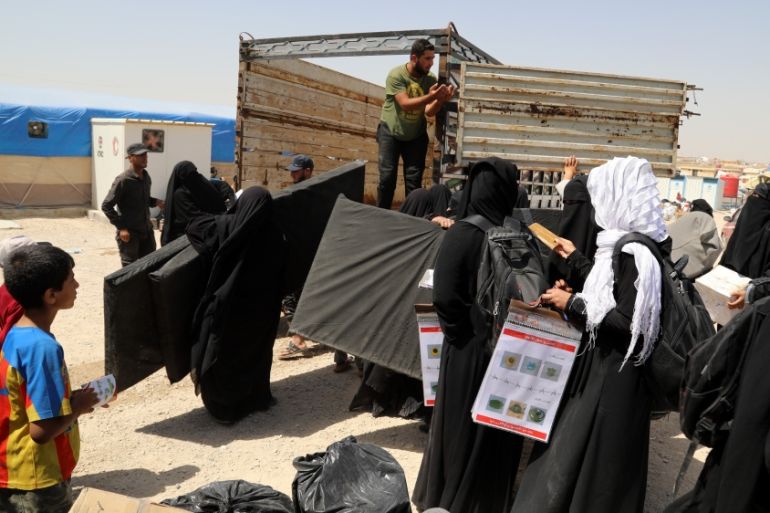Canada repatriates 14 citizens from ISIL camps in Syria
It is the fourth repatriation operation conducted by the Canadian government of its nationals being held in a Syrian camps for foreigners accused of ISIL affiliation.

Four women and 10 children have been repatriated by Canada from detention camps for foreign fighters and their families in northeastern Syria.
It was the fourth repatriation operation conducted by the Canadian government of its nationals held in camps in Syria for foreigners accused of being associated with the armed group ISIL (ISIS).
Keep reading
list of 3 itemsFrance repatriates 47 nationals from northeastern Syria camps
HRW: More must be done to help ISIL camp repatriates reintegrate
Three of the women were arrested in Montreal at the airport before appearing in court on a “terrorism peace bond application” – a type of restraining order, Canadian police said in a statement on Friday.
One, an unidentified 38-year-old woman, was transported to Alberta province in western Canada and released on bail pending a hearing on the conditions of her status.
“This is not a criminal charge,” her lawyer Lawrence Greenspon told AFP news agency, adding the prosecutor will want to “ensure that the person follows the conditions for a period of up to one year.”
The other two, Ammara Amjad and Dure Ahmed, “will remain in custody until their next hearing, which is scheduled for Tuesday”, police said.
“Everything was good” regarding the fourth woman, said Greenspon, who is representing all four women.
She faces neither criminal charges nor a request for a peace bond.
“The 10 children are repatriated and are with their families here in Canada,” said Greenspon.
It remains unclear whether any of those being repatriated could face prosecution for alleged involvement with the armed group.
“Where there is sufficient evidence, law enforcement and public safety agencies will independently take the necessary steps to keep our communities safe,” a Foreign Affairs Ministry statement said.
Canadian Prime Minister Justin Trudeau has previously faced criticism for moving slowly to repatriate Canadians held in the Syrian camps, widely known for poor conditions.
According to Human Rights Watch, more than 42,400 foreign adults and children accused of being affiliated with ISIL have been detained in Syria.
![People use umbrellas as they walk in the rain at Camp Roj, where relatives of people suspected of belonging to ISIL (ISIS) are held in Syria's northeastern Hasakah province [File: Delil Souleiman/AFP]](/wp-content/uploads/2021/10/000_94A4UY.jpg?w=770&resize=770%2C513)
The Foreign Affairs Ministry said on Thursday it was concerned for the “health and well-being” of the Canadian children following the “deteriorating conditions in the camps” where they were confined until recently.
Last October, Canada repatriated two women and two children held in Syria. In 2020, Ottawa allowed the return of an orphaned five-year-old girl after her uncle filed a lawsuit against the government.
Since ISIL was territorially defeated in 2019, many countries have been reticent to accept the repatriation of women and children of foreign fighters.
Countries around the world have debated how to deal with citizens who joined ISIL but now wish to return to their home countries.